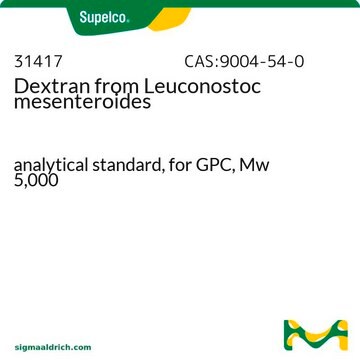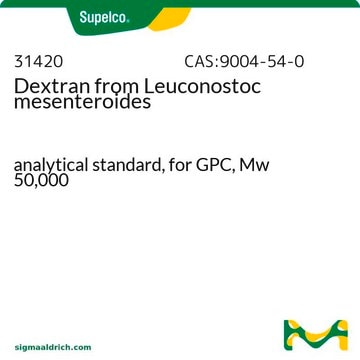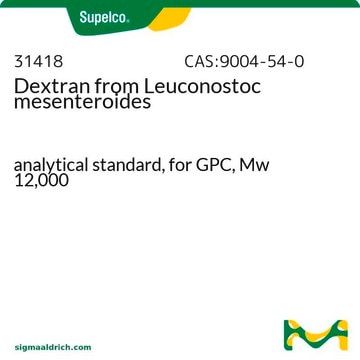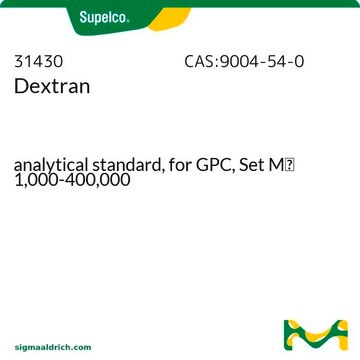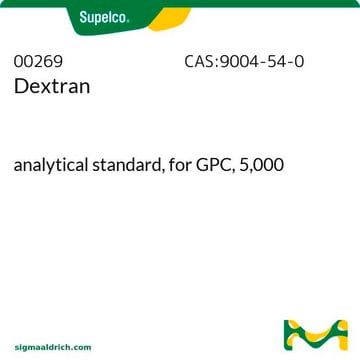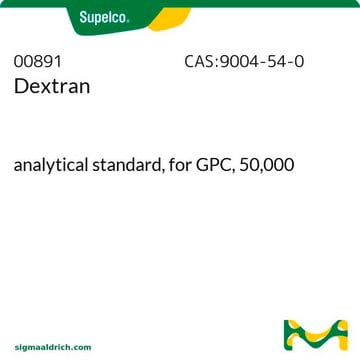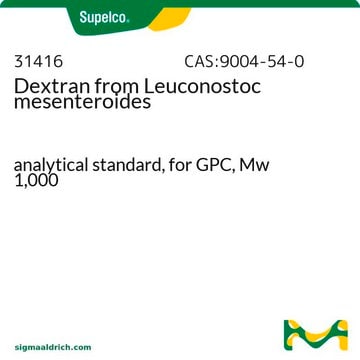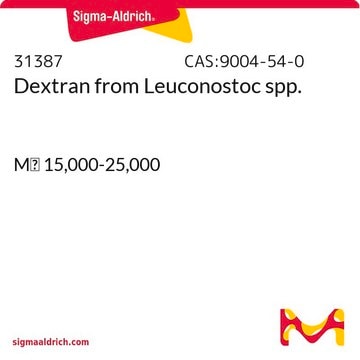31419
Dextran from Leuconostoc mesenteroides
analytical standard, for GPC, Mw 25,000
Sign Into View Organizational & Contract Pricing
All Photos(1)
About This Item
Linear Formula:
(C6H10O5)n
CAS Number:
EC Number:
MDL number:
UNSPSC Code:
12352201
NACRES:
NA.24
Recommended Products
grade
analytical standard
for GPC
Quality Level
mol wt
Mn ~20,000
Mp ~20,000
Mw ~25,000
analyte chemical class(es)
oligosaccharides
technique(s)
gel permeation chromatography (GPC): suitable
Mw/Mn
~1.25
application(s)
food and beverages
format
neat
InChI
1S/C18H32O16/c19-1-5(21)9(23)10(24)6(22)3-31-17-16(30)14(28)12(26)8(34-17)4-32-18-15(29)13(27)11(25)7(2-20)33-18/h1,5-18,20-30H,2-4H2
InChI key
FZWBNHMXJMCXLU-UHFFFAOYSA-N
Looking for similar products? Visit Product Comparison Guide
Related Categories
General description
Dextran is a D-glucosyl homopolysaccharide which has a-1,6 glucosidic linkages with different branches through α-1,2, α-1,3, and α-1,4 linkages correspondingly classified as group A, B and C. It can be synthesized from sucrose by cell-free filtrate.
Dextrans are polysaccharides with molecular weights ≥1,000 Dalton, with a linear backbone of α-linked D-glucopyranosyl repeating units. Dextrans are found as bacterial extracellular polysaccharides. They are synthesized from sucrose by Leuconostoc mesenteroides and Lactobacillus brevis. Bacteria employ dextran in biofilm formation or as a protective coating to evade host phagocytes in the case of pathogenic bacteria.
Dextran from Leuconostoc mesenteroides (Mw: 25,000) may be used as an analytical standard to calibrate the column for gel permeation chromatography (GPC).
Dextran from Leuconostoc mesenteroides (Mw: 25,000) may be used as an analytical standard to calibrate the column for gel permeation chromatography (GPC).
Application
Markers-dextran with 25000 Da has been used as standard in gel chromatography analysis to determine fractional composition of protein, carbohydrate, phenolic surface active substances in base wine.
Use of dextrans as long and hydrophilic spacer arms improves the performance of immobilized proteins acting on macromolecules.
Storage Class Code
11 - Combustible Solids
WGK
WGK 2
Flash Point(F)
Not applicable
Flash Point(C)
Not applicable
Personal Protective Equipment
dust mask type N95 (US), Eyeshields, Gloves
Choose from one of the most recent versions:
Already Own This Product?
Find documentation for the products that you have recently purchased in the Document Library.
Customers Also Viewed
Elizabeth M Bradshaw et al.
Nature neuroscience, 16(7), 848-850 (2013-05-28)
In our functional dissection of the CD33 Alzheimer's disease susceptibility locus, we found that the rs3865444(C) risk allele was associated with greater cell surface expression of CD33 in the monocytes (t50 = 10.06, P(joint) = 1.3 × 10(-13)) of young
Ana Luisa Miranda-Vilela et al.
Journal of biomedical nanotechnology, 9(7), 1261-1271 (2013-08-06)
This work aimed to test a dextran-functionalized magnetic fluid (DexMF) sample in mediating magnetohyperthermia to treat an advanced clinical Ehrlich-solid-tumor, to verify the effects of oral antioxidant administration of pequi-oil on this treatment and to investigate the potential of these
Ngalle Eric Mbua et al.
Proceedings of the National Academy of Sciences of the United States of America, 110(25), 10207-10212 (2013-06-05)
Niemann-Pick type C (NPC) disease is characterized by impaired cholesterol efflux from late endosomes and lysosomes and secondary accumulation of lipids. Although impaired trafficking of individual glycoproteins and glycolipids has been noted in NPC cells and other storage disorders, there
David Needham et al.
Faraday discussions, 161, 515-534 (2013-06-29)
This paper describes how we have used material science, physical chemistry, and some luck, to design a new thermal-sensitive liposome (the low temperature sensitive liposome (LTSL)) that responds at clinically attainable hyperthermic temperatures releasing its drug in a matter of
Hideto Katsuta et al.
Investigative ophthalmology & visual science, 54(6), 4102-4108 (2013-05-23)
To elucidate the role of signals mediated by EphB4 receptor tyrosine kinase and its transmembrane ephrinB2 ligand in corneal lymphatic capillaries. To detect expression of ephrinB2 and EphB4 in mouse corneas, immunohistochemistry of flat-mount corneas from 6- to 10-week-old wild-type
Our team of scientists has experience in all areas of research including Life Science, Material Science, Chemical Synthesis, Chromatography, Analytical and many others.
Contact Technical Service